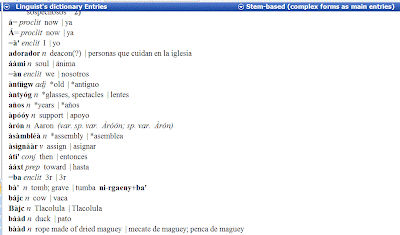The idea for the San Dionisio Ocotepec Zapotec dictionary is to have two versions
The dictionary for linguists will have
The dictionary for native speakers will have
The dictionary for linguists will have
- the regular orthography with phonation, length, and tone indicated
- no separate pronunciation
- English before Spanish
- it also includes clitics and affixes
- possibly it includes more loan words that appear in texts (but which speakers may not want in their dictionary)
The dictionary for native speakers will have
- the practical orthography
- a separate pronunciation field that shows phonation, length, and tone between [ ]
- Spanish gloss before the English
It is not too difficult to produce both these dictionaries in FLEx. You want to go List | Publications and add "Linguist's dictionary". By default, most lexical entries will show in their Publications Setting that they appear in both the Main Dictionary and the Linguist's Dictionary:
For items that you don't want to appear in the Main Dictionary, you find the entry, and delete "Main Dictionary" from the Publish In list.
You can do this manually, or you can Bulk Edit the lexical entries. You filter the entries to show only those with +, -, or = in the Lexeme form field. (Or for Borrowed in some field, or whatever you want to exclude.) You can then use the Bulk Edit to change the value of the Publish In field to whatever you want.
Once you have two dictionaries listed in the Publications list, you can use the Tools | Configure menu to include, format, and order fields differently in the two dictionaries.
A remaining puzzle now -- the regular orthography that I designed a few years ago now seems too complex for Zapotec speakers to use. It is directly transferable to a phonemic orthography, but uses Spanish-influenced spelling (like <c> and <qu> for /k/, <ch> for /tʃ/, etc.). My previous papers on the language used this orthography. But does it have any real use now? Should I just write things for linguists in IPA? (Confession -- I think IPA is too cumbersome for anything but phonology...)




2 comments:
Very interesting. A question: why is pronunciation shown in the linguists' version but not in the native speaker version? I'd have guessed it would be the other way around.
Regardless, this is an ambitious and worthwhile project. Congratulations!
The idea is that for the linguist's version, the pronunciation is the headword.
The headword for native speakers is a simplified spelling, but linguists probably don't need this. (Or could predict it...)
Post a Comment